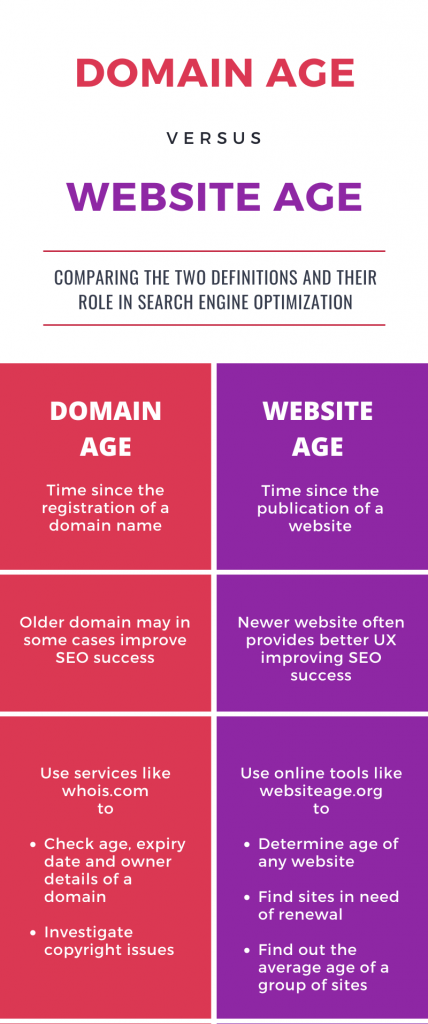There are several domain age checker tools out there to check the age of a domain. Similarly, there’s a belief that an aged domain would automatically mean better search engine visibility.
It’s important, however, to know the difference between domain age and website age, and how each of these affect your pursuit of business growth or SEO capabilities.
What Is Domain Age?
Domain age refers to the time since a certain domain name (such as yourdomain.com) has been registered. If the domain name has been registered in January 2010, its age will be 11 years by January 2021.
What Is Website Age?
Unlike domain age, website age refers to the time since the publication of a website. A domain name can be purchased before any website on it will be published, and on the other hand, one domain can be home for several different websites, even with different owners and agendas. One owner also often has different versions of a website on the same domain.
Let’s say that you have registered a domain name (exampledomain.com) in 2010, then published your first website in 2011 and renewed it entirely in 2016. That would mean that in November 2020, your domain age is 10 years and the age of your current website is four years.

Does Age Of Domain Matter?
There’s a common belief that the age of a domain correlates with how high any page on it will appear in the search engine results. The belief is that an older domain would have better SEO capabilities than a newer one.
It’s true, that an old domain can have established a high domain authority thanks to a strong link profile and high number of shares and traffic it may have acquired during the years. This will make it easier for them to rank higher.
However, domain age is never automatically an indicator of SEO success. It’s possible that even if the domain and its website have been around for a long time, they still don’t have a strong link profile or good quality content. Some sites may have even had issues like spamming or the use of black hat SEO tactics, which would harm their relationship with Google.
Quality vs. Quantity
In link building, it’s more quality than quantity that matters, as well explained also in this article by Grow With Studio. A newer domain name can very well have better search engine visibility than an old one, if they have invested in SEO quality content. As an example of that, we have received good rankings for many new domains, including websiteage.org which was registered in June 2020 and in just four months, already had reached top spots for desired keywords.
If you consider buying an old domain in the hope of gaining instant online visibility, remember to consider this:
- What is its domain authority?
- Will you be able to keep up and provide similar content on the same topics the domain already has?
If your new content won’t correspond to any links coming to the domain, the links will lack in relevance and be lower in quality. They won’t help keep your rankings high for long. Likewise, if you can’t keep any old content, you will lose all links coming to that.
When To Use A Domain Age Checker?
Use the WhoIs directory or some other domain age checker to check the age, expiry date and owner details of any domain you’re interested in purchasing, or if investigating any copyright issues.
Some also use domain age tools to find out how long a business has been around for, to see if they are legitimate. This is fine, although the most accurate place to check that would be via a corporate registry (see list of worldwide registers here).
If on the other hand, you just want to find out the SEO rankings of your competitors, use tools like Moz or Ubersuggest. These tools will give you good insights into a domain’s authority, their most popular contents as well as the keywords they best rank for.
How To Check Website Age?
To check website age, we have developed an easy-to-use online scanner, which gives you reliable results within a few seconds.
We did a market survey in early fall 2020 to find out the average website age for strong mid-sized Finnish corporations. In this survey, we used our bulk search feature as well as interviews to check the age of 334 websites. It turned out that:
- Our scanner worked reliably by giving the correct answer in at least 80 % of cases, and
- The average age of a website is four years. Only 10 % of companies have a site older than five years and the vast majority make at least small updates to the site on an ongoing basis.
While in domain age, older may in some cases correlate with better SEO success, for website age, newer is often better in terms of usability and technical features. The SEO of 2020 emphasizes quality and user experience. By offering up-to-date quality content and a seamless user experience, you have a good foundation for achieving great online visibility.
Why Check Website Age?
Maybe you’re from a tech company or a freelance web designer trying to find new prospects. Maybe you would like to do a market survey of your own for your target groups. Or maybe you’re just curious to find out the age of any given website in your industry or elsewhere.
With our web page age checker tool, you can easily scan individual or a whole list of URLs to discover any old pages in need of renewal or to compare website ages.
Use our scanner to check three URLs for free, or visit our shop to subscribe to unlimited or bulk searches.